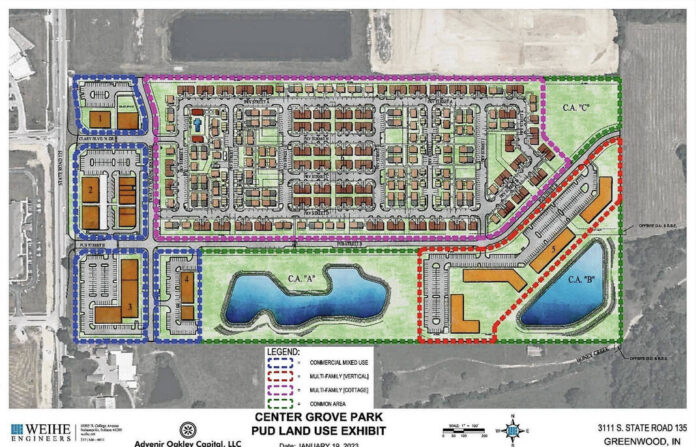
The preliminary site plan for the Center Grove Park Planned Unit Development along Greenwood’s southwest side. The city council voted 6-3 against rezoning land for the project.
Map provided by City of Greenwood
Greenwood’s city council voted against a rezoning proposal that would have brought apartments, rental homes and retail spaces to the city’s far southwest side.
Florida-based Advenir Oakley Capital LLC., in partnership with Ellis Park, LLC by Lushin Investments, had requested to rezone approximately 77 acres of land located at 3111 S. State Road 135 from commercial large and agricultural zoning for a mixed-use Planned Unit Development containing retail, single-family homes and apartments. The city’s Advisory Plan Commission had unanimously given a favorable recommendation to the proposal last week.
However, during Wednesday’s meeting, they voted 6-3 on against the proposal. Council members Ron Bates, Erin Betron, Ezra Hill, David Hopper, Brad Pendleton and Michael Williams voted against the rezoning, while Mike Campbell, Linda Gibson and David Leske voted in favor of it.
The vote was unusual because in most situations the city council typically votes in favor of projects that come before them with a favorable recommendation. There was no public opposition to the proposal as no one spoke out about the project during the plan commission hearing or the council meeting.
A majority of council members are facing primary challenges on May 2.
The Center Grove Park PUD would’ve consisted of three distinct areas: commercial mixed-use, apartments and single-family-rental homes to be developed in three phases, according to city documents.
The commercial area would have up to 150,000 square feet of space for commercial, office and retail uses. There would have been up to 250 units of one to three-bedroom apartments and up to 325 single-family rental homes with one to three bedrooms. Both the apartments and the rental homes would’ve also had their own amenity areas, city documents say.
Center Grove Park was expected to draw residents from various groups, with 36% of residents expected to be older adults considered “empty nesters,” mature singles or active adults. Young couples and graduates were expected to take up about 26% of residential spaces, while young families and single parents were expected to take up 18%, said Scott Weathers, Advenir Oakley Capital development and construction manager.
Everything for the development was to be vertically integrated, meaning Advenir would’ve been responsible for developing, constructing and managing the units. Both Advenir and Lushin planned to hold on to the project long-term, Weathers said.
Putting the development forward as a PUD encourages flexible development of the land, said Gabe Nelson, city planning director. City planning staff had supported the project because, under the city’s comprehensive plan, the land was preferred to be used for mixed-use projects.
Council members asked questions about the number of units and commercial lots. Council member David Hopper asked about the developer’s design plans for the commercial lots, and Weathers said it was going to be integrated into the craftsman-style design of the residential buildings.
Hopper also asked whether the development would use vinyl siding, and Weathers assured the city council it would not. They already stated in the PUD documents that they would not, he said.
Council member Brad Pendleton spoke out against the ordinance, citing his known concerns about the city’s public safety staffing. He had recently been looking at the city’s crime map, which showed non-violent crime had gone up since 2019, he said.
The crime data map shows burglary, criminal mischief, suspicious persons/circumstances and theft reports, all typically non-violent crimes.
In 2019, there were 1,212 incidents and in 2020 there were 1,146 incidents. The number increased to 1,310 by 2021, and last year the number of reports more than doubled to 2,506, according to data from the crime map.
It was alarming that the numbers had increased and were going up faster than the city could catch up with public safety staffing, Pendleton said.
No other council member spoke during the meeting about their vote.
The city council will not re-vote on the ordinance anytime soon. The same rezoning proposal is not allowed to come back before the council for a year, city council president Mike Campbell said Friday.
The developer does have the option to ask for a different kind of zoning, which could allow it to come back before then, he said.




